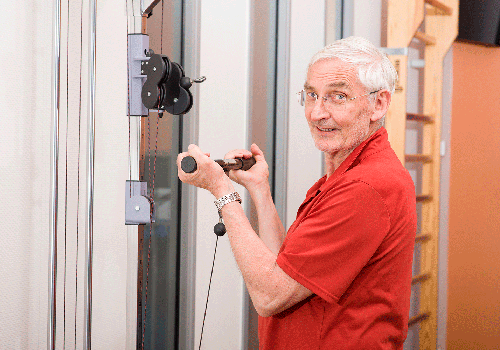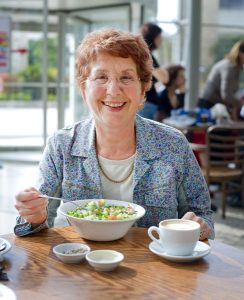Older people really benefit from adopting a healthy lifestyle
“I’m so old now, it no longer matters what I eat,” says my 70-year-old neighbour, taking another sweet from the bowl. But a healthy lifestyle and, especially, healthy eating and physical activity are important, perhaps more so when you are getting on in years.

These are moving times: the senior citizen community is increasing and the government wants to support them to remain independent for as long as possible. Food manufacturers and research institutes are showing increasing interest in older people and this is good news for our seniors as they still have much to gain, in health terms, from eating well. As the Wageningen University & Research Professor of Nutrition and Ageing, I am driven to contribute to this debate by conducting research studies that produce valuable insights.
Our first research project into nutrition and older people, the European SENECA study, began over thirty years ago. Even then it was clear that adequate nutrition, along with a healthy lifestyle, did make a real difference to older people. Participants who ate well, did not smoke, were physically active and did not drink much alcohol had a 60% better chance of still being alive after ten years than their peers with less-healthy lifestyles. They also felt fitter and were able to manage independently for longer – results that have since been confirmed by later studies.
Slowing down the ageing process
The SENECA study produced many interesting research hypotheses about, for example, the role of B vitamins and vitamin D in slowing down the ageing process. They were the starting point for various intervention studies into the retention of functionality – of the bones, muscles, cognitive capacity and appetite – as people get older. In other words, they triggered current studies into how nutrition can retard processes such as osteoporosis (causing bones to become brittle and fragile), sarcopenia (loss of muscle mass), cognitive deterioration and anorexia (lack of appetite).
We are finding growing evidence that certain foodstuffs really can help to counteract ageing related processes.
We are finding growing evidence that certain foodstuffs, in combination with healthy eating patterns, really can help to counteract ageing related processes. There are already specific recommendation for vitamin D for older adults. I expect that, with the completion of a number of large-scale research projects, such as the European NU-AGE initiative, the contribution of proteins and B vitamins will also become clearer.
Healthy lifestyle: eating patterns
 Our university continues to select and initiate the best possible research projects, using innovative measuring techniques and investigating challenging hypotheses – for example about the interactions between foodstuffs, and the role of eating patterns. We also act as a bridge between our own nutrition research, clinical research in university hospitals and research on ageing being conducted in the Netherlands.
Our university continues to select and initiate the best possible research projects, using innovative measuring techniques and investigating challenging hypotheses – for example about the interactions between foodstuffs, and the role of eating patterns. We also act as a bridge between our own nutrition research, clinical research in university hospitals and research on ageing being conducted in the Netherlands.
I am convinced that if researchers, industry and the government continue along this path, my neighbour’s diet – and that of many of her peers – will soon look much healthier. And that is ultimately what I want to achieve.
If you would like to know more about current research into nutrition and older people, please contact us or leave a comment below.

